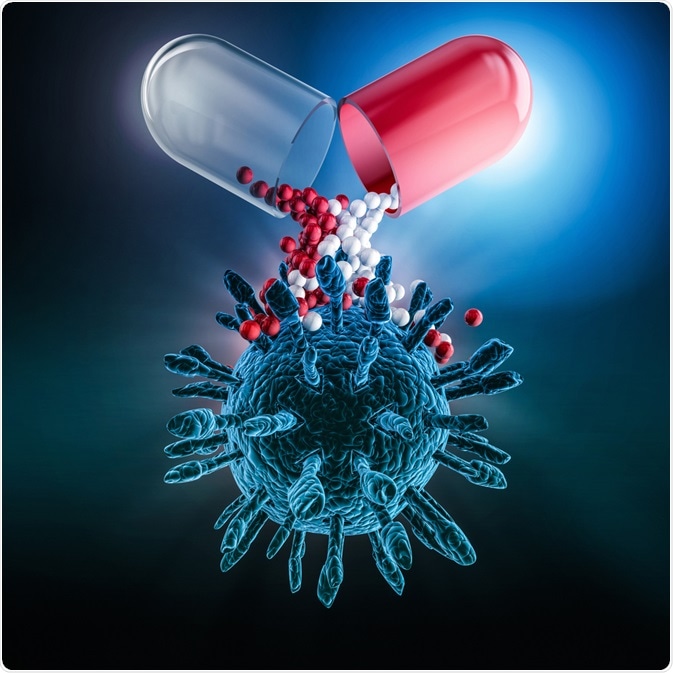
PEG’s role in biopharmaceuticals and the induction of anti-PEG antibodies

Image Credit: Double Brain/Shutterstock.com
PEG, or polyethylene glycol, is a synthetically constructed polymer, made of repeating units of ethylene glycol (-CH2-CH2-O-). It is known for its properties of being water-soluble, as it is strongly hydrophilic with a large exclusion volume in aqueous solution, and it is also resistant to non-specific protein adsorption.
It also has low toxicity and is known as being a “non-fouling” substance. Due to these unique characteristics, PEG has found itself being used in the field of biopharmaceuticals as a coating for drugs made of proteins, peptides, drug-antibody conjugates, aptamers, or monoclonal antibodies to facilitate their delivery.
While biopharmaceuticals have gained much success, with over 200 products entering the market over the past 30 years, and just under 1,000 more in development, they are limited by their instability, short half-life, and their ability to evoke the immune response.
These constraints have resulted in problems, such as that the drugs are cleared from the body too quickly, which can be a major concern when using biological drugs over long periods. The constraints also add to the potentially life-threatening side effects of the drugs, such as inducing infusion reactions or anaphylaxis.
The special properties of PEG coatings help to overcome the limitations of biopharmaceutical drugs. The addition of PEG increases the half-life of a drug by extending the circulation time due to the unique surface conjugation of PEG on proteins. Also, PEG coatings have the impact of increasing the hydrodynamic size and masking the surface epitopes of the biopharmaceutical drugs, having the effect of reducing immunogenicity.
However, research is now elucidating that there are repercussions of using PEG in this way. Mounting evidence is showing that the use of PEG as coatings for biopharmaceutical drugs can induce an immune response, resulting in an influx of anti-PEG antibodies, proteins that are introduced into the system to recognize and bind to PEG and break it down.
Research has demonstrated the presence of these anti-PEG antibodies is correlated with a decreased therapeutic efficacy of the drug being examined, along with an increased prevalence of adverse side effects.
The importance of understanding the influence of anti-PEG antibodies in biopharmaceuticals
Because biopharmaceuticals have become increasingly utilized, and the method of adding PEG to enhance their effectiveness has become established as common practice, it is important to understand the relationship between the PEGylation of drugs and the existence of anti-PEG antibodies, and what impact this has on the behavior and effectiveness of the drug.
As more PEGylated drugs are entering the marketplace, there has been an increase in the number of studies investigating the generation of anti-PEG antibodies in response to administering PEGylated drugs.
Scientists are using anti-PEG antibodies to sensitively measure PEGylated compounds, allowing for the monitoring of the pharmacokinetics of a drug, such as its metabolism, distribution, and excretion. Also, the use of anti-PEG antibodies has become established in the practice of quality control of PEGylated molecules, such as those created for therapeutic use.
The advent of nanomedicines has made this application of anti-PEG antibodies even more important. Clinical trials have revealed that in some cases patients develop reactions to nanomedicines, but it is still not well understood what makes certain nanoparticles more reactogenic.
Recent studies have found that some anti-PEG antibodies are at least in part responsible for the infusion reactions initiated in patients following drug administration.
Numerous studies have proven that the level of anti-PEG antibodies is indeed positively correlated to a reduction in the therapeutic efficacy of a drug, while at the same time being positively correlated to the observance of adverse side effects.
This impact is particularly important when considering drugs that are administered on a long-term basis. The immune system’s release of anti-PEG antibodies in response to PEGylated therapeutic drugs can prevent the suitability of using the drug to treat chronic illnesses.
While still in its infancy, research utilizing anti-PEG antibodies is already helping scientists uncover how PEGylated products can be made more effective, safe, and suitable for long term use.
As more of these therapeutic drugs are developed, and more clinical trials will be conducted to test their suitability, even more data will be collected to enable researchers to understand how to amend their PEGylated drugs to avoid the drawbacks of initiating an immune response, leading to the release of anti-PEG antibodies.
Advances in this field will likely have a significant impact on future therapeutic options. Shortly, patients with illnesses such as gout, hemophilia, chronic kidney disease, severe combined immunodeficiency disease (SCID), Crohn's disease, rheumatoid arthritis, some cancers, and more, face the possibility of having more effective and safer drugs available to treat them.
Sources:
Moreno, A., Pitoc, G., Ganson, N., Layzer, J., Hershfield, M., Tarantal, A. and Sullenger, B. (2019). Anti-PEG Antibodies Inhibit the Anticoagulant Activity of PEGylated Aptamers. Cell Chemical Biology, 26(5), pp.634-644.e3. www.cell.com/cell-chemical-biology/pdfExtended/S2451-9456(19)30035-2
Neun, B., Barenholz, Y., Szebeni, J. and Dobrovolskaia, M. (2018). Understanding the Role of Anti-PEG Antibodies in the Complement Activation by Doxil in Vitro. Molecules, 23(7), p.1700. https://www.ncbi.nlm.nih.gov/pmc/articles/PMC6100003/
Zhang, P., Sun, F., Liu, S. and Jiang, S. (2016). Anti-PEG antibodies in the clinic: Current issues and beyond PEGylation. Journal of Controlled Release, 244, pp.184-193. https://www.ncbi.nlm.nih.gov/pmc/articles/PMC5747248/
Further Reading
- All Antibody Content
- Antibody – What is an Antibody?
- Antibody Forms
- Antibodies in Medicine
- Antibody Structure
Last Updated: Jan 30, 2020

Written by
Sarah Moore
After studying Psychology and then Neuroscience, Sarah quickly found her enjoyment for researching and writing research papers; turning to a passion to connect ideas with people through writing.
Source: Read Full Article